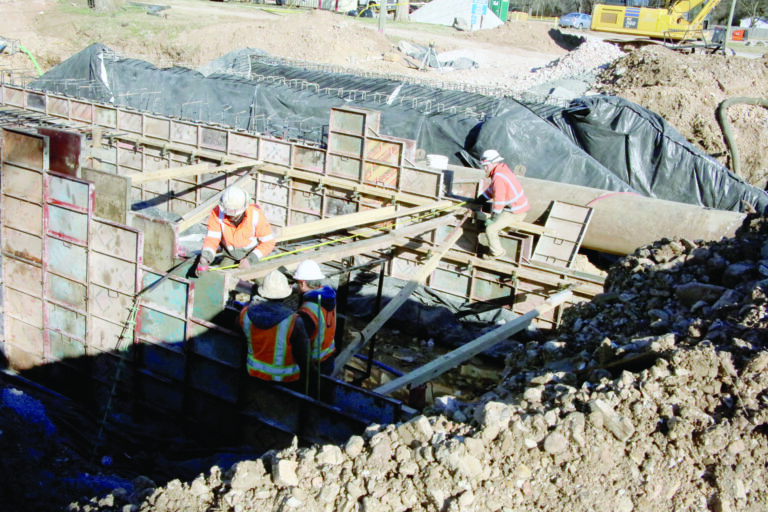State fertilizer inspector speaks out
MoFCB does not test Denali, Synagro wastewater residuals
By Sheila Harris [email protected]
Jerry Ennis, of Exeter, the lead fertilizer inspector for the Missouri Fertilizer Control Board (MoFCB), called the Cassville Democrat last week “to set the record straight” regarding the testing of wastewater residuals (permitted as fertilizer) being land-applied by Denali and Synagro in southwest Missouri.
“I want everybody to know [state fertilizer inspectors] aren’t the bad guys,” he said.
Ennis began as a field inspector for the Missouri Fertilizer Program 30 years ago, when the program was under the auspices of the University of Missouri. The university still signs his paychecks, he says. During his years with the fertilizer program, he has primarily represented the southwest region of the state, and has drawn samples of bulk and packaged fertilizers being sold to farmers with a guaranteed nutrient analysis.
Now, as a lead inspector, Ennis says he travels throughout the entire state and oversees the operations of each region.
“The lab results from a fertilizer sample aren’t official unless they’re from a sample we’ve drawn,” Ennis said. “I have never drawn samples of any of the stuff that Denali and Synagro are spreading on fields around here.”
Nor has he drawn samples from the Denali lagoons in Newton and McDonald Counties. Ennis says there’s a reason for it.
“Denali and Synagro are giving the stuff away free and are not guaranteeing any type of nutrient content to farmers,” he said. “We only test products that are sold to farmers with a guaranteed nutrient analysis.”
Ennis is concerned about Denali’s and Synagro’s practices.
“On one hand,” he said, “Denali is guaranteeing to the MoFCB that their product contains a plant nutrient in order to get a fertilizer permit, but on the other hand, they are not guaranteeing farmers anything.”
During his years as an inspector for the state’s fertilizer program, Ennis has always asked himself who he is protecting by performing lab tests on fertilizer samples.
“It’s the farmer, always the farmer,” he said. “I want to make sure they’re getting what they’re paying for.”
Now, Ennis is concerned that he might not be protecting farmers by not pulling samples of the free residuals from Denali and Synagro.
“If Denali and Synagro were charging farmers for it, or guaranteeing the nutrient content of it, I’d come home at the end of the day smelling like the stuff,” Ennis said.
Ennis does keep his eye on the annual and semi-annual reports from test samples that Denali and Synagro submit to the MoFCB.
A recent test sample from George’s wastewater residuals, filed with the MoFCB by Synagro, contained a fertilizer analysis ratio of .08 nitrogen / .04 phosphorus / 0 potash, Ennis said.
“There aren’t enough nutrients in that ratio to do crops much good,” he said.
“By way of comparison, if you were to go to a fertilizer plant to buy fertilizer for a good hay crop, you’d probably want something high in nitrogen,” Ennis said. “That ratio might be what we call ‘3/1/2,’ or 22.8 nitrogen / 7.6 phosphorus / 15.2 potash.”
Ennis says one of his personal priorities, now, is to educate farmers to the questionable nutrient content of the wastewater residuals.
“The benefit, if any, probably comes from the extra water,” he said.
A big question for Ennis, though, is what else might be in the stuff referred to by locals as “sludge.” It’s a question many southwest Missouri residents have.
Nor does Ennis understand why a fertilizer permit from the MoFCB counts as a land-application permit exemption from the Missouri Department of Natural Resources (DNR).
“I’m not sure when that happened,” he said. According to Heather Peters, with the Watershed Protection Section of the Department of Natural Resources, the fertilizer permit exemption has been in the department’s rules since at least 1998 (the earliest electronic archive available).
Steve Taylor, director of the MoFCB, believes that because the volume of materials has increased and the industry has grown so much since then, it might be time to revisit the DNR regulation that allows for that permit exemption.
Contrary to what was surmised in a prior Cassville Democrat article, Taylor says the DNR’s hands are not tied by the “permissiveness of the Missouri Fertilizer Control Board.”
“The DNR can change their regulations regarding permits any time they choose to, including exemptions from a no-discharge permit,” he said.
Ennis believes that offering their residuals for free is the key to Denali’s operations in Missouri.
“Because they are not charging the farmers for their residuals and are not guaranteeing the analysis of them, they are not subject to the penalties that other distributors might face for violations,” Ennis said.
Free residuals, however, may not be enough to exempt Denali from the repercussions of a March 1 incident in which wastewater residuals were over-applied in McDonald County by Denali subcontractors.
“It appeared to have been a deliberate over-application on a hillside at the far end of a large property,” said Brian Hall, McDonald County presiding commissioner. “The stuff ran down the hill, onto the neighbor’s property and into a spring-fed creek that the neighbor’s cattle drink from.”
According to recommendations in Missouri Department of Natural Resources document PUB3049, liquid fertilizer should be applied at a reduced rate on a hillside.
The sludge runoff precipitated a meeting of landowners and local and state officials at the McDonald County Courthouse in Pineville on Thursday to discuss the land-application of wastewater residuals in southwest Missouri. The meeting, convened by Missouri House Representative Dirk Deaton, R-Noel, was open to the public but was not publicized beforehand.
“I learned about it Wednesday,” said Barry County presiding commissioner Steve Blankenship, who was in attendance.
According to Blankenship, the neighbor who was the hostile recipient of Denali’s runoff was present at the meeting with photos of the compromised area of his land and creek.
“It looked like a terrible mess,” Blankenship said.
Hall said everyone in attendance at the meeting agreed that there was a problem and that they needed to come up with a course of action.
Hall was pleased that Missouri legislators took time during their spring break to travel to Pineville to discuss the concerns of residents regarding the land-application of waste in the area.
According to a statement released by Deaton, those present at the meeting included representatives from the Missouri Fertilizer Control Board, the Missouri Department of Natural Resources, the Missouri Department of Agriculture, the Governor’s office, Congressman Burlison’s office, Senator Schmitt’s office, commissioners from McDonald, Newton and Barry Counties, and other elected county officials, state representatives and state senators.
Steve Blankenship indicated that State Senator Mike Moon, R-Ash Grove, and State Rep. Scott Cupps, R- were both present.
“During the meeting, we had an open and honest discussion about the numerous questions, concerns and complaints that have been raised over a significant period [of time],” Deaton said in his press release. “More recently, there have been violations of the Missouri Clean Water Law relating to over-application and runoff. This is especially concerning to me, [as well as the] conditions that enabled them to occur.”
Steve Taylor, director of the MoFCB, was present at the meeting.
“I was glad to see the focus placed on the real issue, the violation of the DNR’s Clean Water Law,” he said.
Deaton said it’s the first time so many elected officials and relevant government agencies had come together to address the topic.
Taylor gives Deaton a lot of credit for organizing the meeting.
Deaton says although he is frustrated by the slow pace of progress, he’s encouraged by the engagement shown by those in attendance.
“I am committed to working with all stakeholders to address concerns and issues in a fair, balanced and just manner,” Deaton said. “Moving forward, I will continue to work with this group and engage other stakeholders to find solutions to these pressing issues.”
CLARIFICATION: In the March 22 edition of the Cassville Democrat, a story on wastewater residual land application in southwest Missouri quoted Missouri Fertilizer Control Board Lead Fertilizer Inspector Jerry Ennis saying “Denali and Synagro are giving the stuff away free and are not guaranteeing any type of nutrient content to farmers.” Sam Liebl, director of sustainability and communication at Denali, said the company does provide farmers who use its fertilizer with a chemical and nutrient analysis conducted by a certified third-party laboratory. Denali uses this analysis, as well as soil tests, to adjust its application rates on each farm. While the MoFCB only tests products sold to farmers with a guaranteed nutrient analysis through the MoFCB, that does not mean Denali and Synagro do not provide nutrient analyses to their customers outside of the MoFCB. Ennis also commented on a Synagro test sample filed with the MOFCB, saying “The benefit, if any, probably comes from the extra water.” This comment is specific to the Synagro sample and not reflective of Denali’s test samples. Denali’s tests typically show significant nutrient values in the material it provides to Southwest Missouri farmers, Liebl said. The Cassville Democrat corrects factual errors or clarifies information promptly and courteously. If you have a correction or clarification, please email Publisher Kyle Troutman at [email protected].


